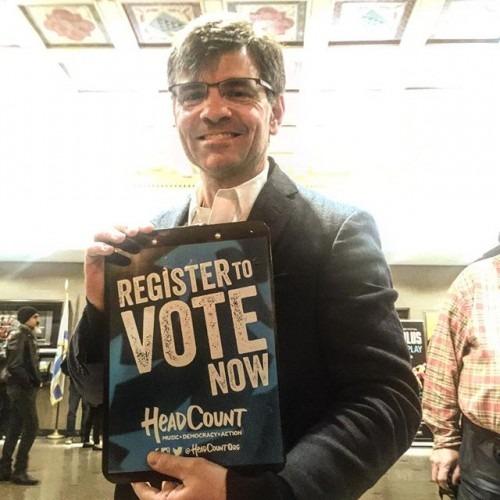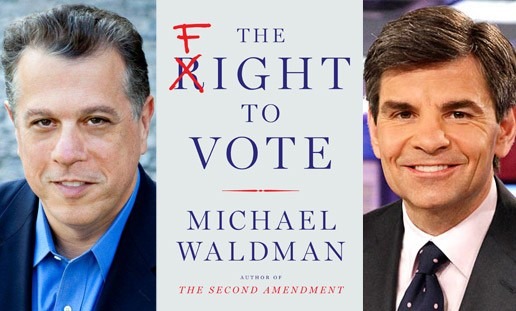Last week I realized just how much I take the right to vote for granted. Not just that I’ve missed an election or two, but I always assumed that as a white man I could take a time machine to any November in American history and vote. Of course that is assuming I brought the right documentation to prove I was a citizen. And it also depends on if we are following the Back to the Future rules of time travel or the Bill and Ted’s Excellent Adventure rules. But this isn’t a discussion of which movie got time travel right (because we all know it is BTTF).
This is about voting rights. And I was kind of shocked to find out that at the start of our republic, only land-owning white males could vote. I own a tent, I own a hammock, but I don’t own any plots of land. Not even one of those houses in Detroit you can buy for $500. So back in the day I wouldn’t be able to vote.
I learned this fact at a discussion between ABC News’ George Stephanopolous and Michael Waldman, the Executive Director of NYU Law School’s Brennan Center for Justice, where the two men talked about Waldman’s new book The Fight To Vote. The discussion was in an intimate room in NYC’s historic 92nd Street Y. The first half of the discussion was a chat between Stephanopolous and Waldman, mainly about his book which covers the history of voting rights struggles in America. All the anecdotes below are paraphrased from this portion of the discussion. Then they opened the floor for questions and I was lucky enough to ask a question to these two brilliant men. The question and answer are included at the end of the blog, but before we get there I want to share a couple fun stories from Waldman’s book. A video recording of the event can be found here.
Essentially the history of America is a history over voting rights.
So in the beginning only land-owning males could vote. In fact John Adams wanted that enshrined in the constitution! Adams’ fear was that if all white men could vote, soon women, or youngsters would get uppity and want to vote too. But luckily for me and all you renters (and women) out there, Ben Franklin fought the good fight to not make that an amendment.
Then most voting expansions were driven by specific parties. The Democratic Party with Andrew Jackson and Martin van Buren (nicknamed “The Little Magician) fought to give all white men voting rights, which dramatically changed the nature of our democracy, and probably has helped that party survive through the modern day.
The next big expansion came during and after the Civil War and was driven by the Republicans. They wanted to expand voting to all men, including black former slaves. That’s where John Wilkes Booth comes in. He is at a speech given by President Lincoln where Lincoln says he wants to make Black Americans citizens. Booth realizes this means they will also be endowed with the right to vote, which was too much for him. He turned to the man next to him and begged and pleaded for him to shoot Honest Abe on the spot. His neighbor at the speech refused, so Booth did it himself 2 days later.
So by then all men were granted the right to vote. But what about the women? They were not. So they got active. In 1913 as Woodrow Wilson descended upon DC for his first inauguration he was shocked as no one was there to greet him besides the Princeton Glee Club. Where was the crowd? A few blocks away, at a march for universal suffrage. But not everyone was happy that women marched for the right to vote. And a mob of men attacked them, sending 100 women to the hospital. You read that right. The men attacked the women, 100 got hospitalized, and thanks to that riot public opinions changed and women soon got the rights that all men did.
Throughout the rest of the 20th century we saw some court decisions that protected voting rights, affirmed the concept of “one man, one vote.” We saw the voting rights act of 1965. And then recently we saw Shelby v. Texas undo much of the Voting Rights Act.

At the end of the discussion I was lucky enough to ask Mr. Waldman a question, “What would you do to make it easier to register to vote?”
He replied “One of the greatest obstacles to registration is our ramshackle voter registration system…We are the only major democracy where the onus to register is placed on private actors, be it the voter, the party or voter registration groups [like HeadCount].
“If the government took on the responsibility of making sure we had universal and automatic registration like in Canada, or England or Germany it would change things quite a bit. It would add 50 million new voters to the rolls, cost less and for those worried about fraud, it would protect against that as well.
“What gives me hope is that there is a lot of energy behind changing the system. States have started to enact versions of this, states like California and Oregon and New Jersey [legislation which Chris Christie vetoed but the veto is expected to be overridden.] Essentially there already is real progress.
“We have an underinvestment in our democracy and these are the changes we need.”
So what I learned is that voting has always been a fight. And that it isn’t inevitable that more people will be able to vote. That we need to keep fighting. That we need to fight for those with felonies to give them the right back, that we need to be ever vigilant, and every ready to defend this amazing power we have as Americans.
